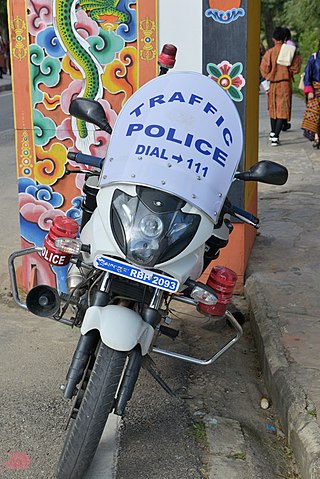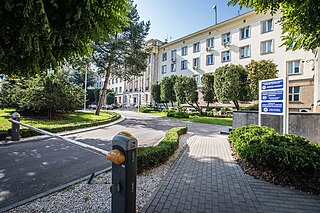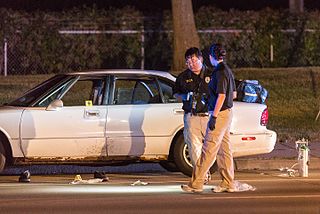
Crime in Moldova, as everywhere in the Post-Soviet states, has risen in the 1990s, after the fall of the Soviet Union, although in recent years there has been an improvement. Corruption in Moldova, economic and drug-related crimes are the most visible and predictable results of the deteriorating economic situation. Racketeering and the mafia have also risen up during the 1990s and 2000s. Petty crimes, such as pickpocketing and street thefts, are also common.

Crime in Canada is generally considered low overall. Under the Canadian constitution, the power to establish criminal law & rules of investigation is vested in the federal Parliament. The provinces share responsibility for law enforcement, and while the power to prosecute criminal offences is assigned to the federal government, responsibility for prosecutions is delegated to the provinces for most types of criminal offences. Laws and sentencing guidelines are uniform throughout the country, but provinces vary in their level of enforcement.

Crime has been recorded in the United States since its founding and has fluctuated significantly over time. Most available data underestimate crime before the 1930s, giving the false impression that crime was low in the early 1900s and had a sharp rise after. Instead, violent crime during the colonial period was likely three times higher than the highest modern rates in the data we have, and crime had been on the decline since colonial times. Within the better data for crime reporting and recording available starting in the 1930s, crime reached its broad, bulging modern peak between the 1970s and early 1990s. After 1992, crime rates have generally trended downwards each year, with the exceptions of a slight increase in property crimes in 2001 and increases in violent crimes in 2005–2006, 2014–2016 and 2020–2021. As of July 1, 2024 violent crime was down and homicides were on pace to drop to 2015 levels by the end of the year.
Crime in India has been recorded since the British Raj, with comprehensive statistics now compiled annually by the National Crime Records Bureau (NCRB), under the Ministry of Home Affairs (India).

Crime rates in Portugal are generally low, and most crimes are non-violent. Portugal's security and peace indicators compare favourably to those of other countries; According to the Institute for Economics and Peace's 2022 Global Peace Index report, Portugal ranks as the 6th most peaceful country in the world.

Crime in Russia refers to the multivalent issues of organized crime, extensive political and police corruption, and all aspects of criminality at play in Russia. Violent crime in Siberia is much more apparent than in Western Russia.

Bhutan has a low crime rate. Incidents of petty crime are occasionally reported in the country. Violent crime is very uncommon. Some cases of drug abuse are reported; alcohol abuse is a problem. But in general, drug trafficking is low. The most serious threat to Bhutan's security is terrorism by different terrorist groups from neighboring countries illegally camped in the nation.

According to the Israel Police, the general crime rate dropped in 2020, while cyber crimes, hate crimes, domestic violence and sexual abuse incidents rose.

Crime in Poland refers to the incidence, deterrence, and handling of criminal activity in the Republic of Poland by Polish law enforcement agencies charged with ensuring public safety and maintaining order. Poland ranks favorably in terms of public safety, with one of the lowest homicide rates in Europe. Poland was ranked 25th in the 2022 Global Peace Index and scored 0.0 on the 2023 Global Terrorism Index.

Crime in Saudi Arabia is low compared to industrialized nations. Criminal activity does not typically target foreigners and is mostly drug-related. Petty crime such as pickpocketing and bag snatching does occur, but is extremely uncommon. During the period of Hajj and Umrah in the holy cities of Mecca and Medina, there have been growing incidents of pickpocketing, especially with women pickpockets becoming an increasing phenomenon. Although incidents of violence are generally considered to be rare, violence has occurred more frequently due to economic pressures on expatriate workers during the last few years. In 2013, the number of crime cases reported by the Ministry of Justice was 22,113, a 102% increase from 2012.

Crime in Qatar is very low compared to industrialized nations. Petty crime such as pickpocketing and bag snatching does occur, but is extremely uncommon. Although incidents of violence are generally considered to be rare, violence has occurred more frequently amid an increase in the population of Doha, the capital and largest city of Qatar, and economic pressures on expatriate workers over the last few years.

Crime in the Maldives ranks from low to moderate, but crime rates in the country have increased significantly in recent years. Incidents of theft on beaches or in hotels do occur. Juvenile delinquency is a growing problem in the Maldives. According to the data available from the Ministry of Defence and National Security, there has been an increase in petty crime in the country. In 1992, 169 cases of petty crime were reported, while the number was 462 in 1996. The number of sentenced persons under the age of 19 also increased from 391 in 1988 to 512 in 1998. Fraud examiner Peter Lilley in his book Dirty Dealing writes that money laundering is not a significant problem in the Maldives.
Crime in Atlanta, Georgia is above the national median and has been a major problem for the city since the middle 20th century.

Crime in Minnesota encompasses a wide range of unlawful activities that occur within the state, regulated by both state and federal laws. While crime rates in Minnesota are generally below the national average, certain areas and types of crime have garnered public attention.
Crime in Greece is combated by the Hellenic Police and other agencies.

Crime in Germany is handled by the German police forces and other agencies.

Crime in Hong Kong is present in various forms. The most common crimes are thefts, assaults, vandalism, burglaries, drug offenses, sex trafficking, and triad-related crimes.

This article discusses crime in Suriname.

Crime in Latvia is relatively low, by global standards, especially compared to previous years, when it was named the "crime capital of Europe" by Forbes in 2008. The homicide rate in Latvia was 4.9 per 100,000 people in 2020, a sharp drop from 10 cases per 100,000 people in 2000, and has been steadily decreasing. Although Latvia'a homicide rate is high by European Union standards, it is below the world average of 6.2 per 100.000. The United States Department of State has assessed Latvia's security rating as "medium", with a moderate crime rate. In recent times, crime has been increasing, particularly due to many Latvians stranded because of the COVID-19 pandemic returning to Latvia and choosing to commit crime. According to Interpol, Latvia is considered an attractive place for regional and organized criminals involved in drug trafficking, arms trafficking, human trafficking, or smuggling. According to the Central Statistical Bureau of Latvia, a third of all women in Latvia have suffered some form of sexual violence or rape, while men are subjected to violence outside the family.

Slovenia is a Central European country with a history of relatively low crime. Slovenia has an assortment of police forces, with the Slovenian National Police Force the primary law enforcement agency.
















